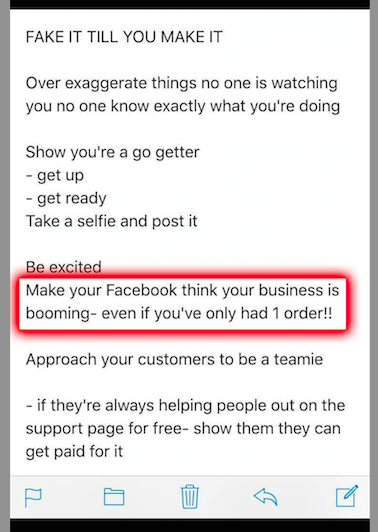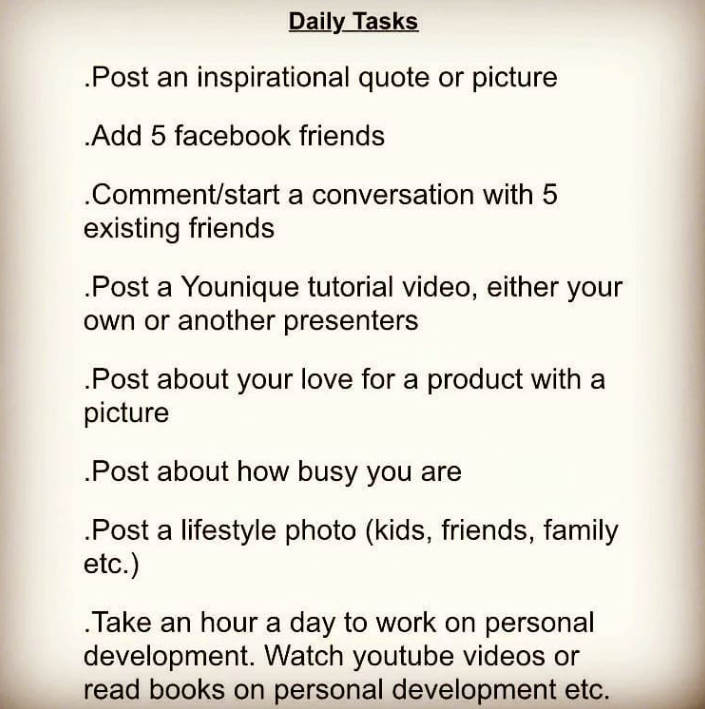Fake it ’til you make it – how MLM reps lie to recruit and sell
Find out why MLM reps are told to ‘fake it ’til you make it’ – and how they use these lies to recruit people to their downlines and sell products.
One of the questions we frequently get asked about MLMs is: “If they’re such a con, why is my friend/colleague/aunt earning so much money from them?”
Let’s take a look at some quick statistics (based on MLMs’ own income disclosure statements) on network marketing earnings:
- “Of 1,000 people who join an MLM, 996 will lose money after subtracting expenses”
- “99.997% of people working on behalf of Nu Skin made no profit or, more importantly, made a loss”
- “88% of Herbalife distributors make no commissions”
- “In reality very, very few people make ANY money from Arbonne”
- “The typical [Stella&Dot] stylist (including inactives) during 2015 earned between $0 to $100”
- “On average, 99% of all [MLM] participants received less than $10 a week in commissions, before all expenses.”
Given these facts, it’s highly likely that your friend/colleague/aunt isn’t enjoying the lavish lifestyle they claim. And in fact, is probably lying.
“97% of USA DSA member companies are misrepresenting earnings”
But before we look at specific examples of some of the lies that MLM reps appear to be telling, we need to examine the ethics of the industry as a whole.
In our own investigations into MLMs, we’ve discovered that the earning potential appears to be incredibly limited for most participants. Indeed, we’ve found nothing to discredit the well-researched statistic that an average of 99.6% of participants in an MLM will not make money (and very likely lose it).
And yet, this is not the impression that MLM companies and their reps often give from their marketing and promotions. Indeed, most are seemingly happy to deceive to recruit.
According to a 2017 survey by Truth in Advertising (TINA.org), a not-for-profit organisation dedicated to empowering consumers to protect themselves against false advertising and deceptive marketing, more than 97% of USA DSA member companies “engaged in misleading marketing schemes that peddle false and unsubstantiated earnings claims trying to convince prospective distributors to join their MLM network”.
The survey found that “137 out of 140 misrepresented the amount of money participants are likely to earn — misrepresentations that cause real and substantial harm to consumers”.
During their survey, TINA.org collected “more than 3,000 examples of companies and/or their distributors making inappropriate earnings claims on their websites and social media platforms”.
And despite the DSA’s self-regulatory Code of Ethics, TINA.org apparently found that every company that holds a seat on their Board of Directors was making unsubstantiated income claims – including Herbalife. They also discovered that, based on 2016 net sales, 100% of the DSA’s 20 top-selling members (including Arbonne) are “employing false and unsubstantiated income claims to market their companies”.
In a separate review of a review of 32 income disclosure statements for current DSA member companies, TINA.org learned that more than 80% of MLM distributors “grossed less than $1,200 annually or less than $100 per month before expenses. And for about half of these companies, the disclosures indicate that the majority of distributors made no money at all”.
MLM reps are often told to lie about their success
The misrepresentations in the industry apparently filter all the way down the sales lines. We often hear that MLM reps are told to ‘fake it ’til you make it’ in order to convince others that they have hit on an amazing opportunity – and recruit them in their downline.
Here’s just one example:

And here’s another from former Younique rep-turned-blogger Elle Beau:

Here’s one LuLaRoe consultant advising another to lie about sales to shift unwanted stock:

Even The Times found that reps for aloe vera MLM Forever Living are encouraged to lie: “FBOs [Forever Business Owners] are told by other members to “fake it until they make it”.”
And even when MLM reps aren’t outright lying about their earnings, they’re crafty about how they use figures and tables to present what looks like an amazing income opportunity – despite the reality being very different, as this article about doTERRA and this investigation into Younique show.
MLM reps use other people’s photos to fake success
Collecting empty boxes to pretend you’re selling more than you really are is one thing. But using fake photos to convince potential recruits you’re more successful than you really are is another level of deception entirely.
And yet it’s something many MLM reps are happy to do.
Don’t believe us? Here’s a Facebook post from a rep showing off the lifestyle paid for by their MLM:

And here’s the results of a quick search on Pinterest for Jimmy Choo shoes. Notice anything familiar about the photo on the right?

Here’s another post from a rep, this time boasting about the Porsche they bought in cash with Amway:

And here’s that exact photo of ‘their’ car in Wikipedia Commons:

Wow my inbox was busy… two years ago!
MLM reps are overly fond of pretending telling us how busy their businesses are. Indeed, here’s one whose inbox has been going SO mental in the last hour that their fingers are aching from inputting all these orders:

Only, are they really? If you look closely at the date on their virtual dashboard, it’s 2016 – two years before this photo was shared. Which can only mean they don’t really have any current orders to boast about.
It’s a bit sad really that you need to resort to using a photo that is two years old to lie about your apparently failing business.
Reps are told to lie about how happy they are
When you’re a rep for an MLM, you can’t afford to have real, human emotions. Instead you’re expected to project positivity every single moment, much like a modern day Stepford Wife.
Here’s a glimpse of training materials, reported to be from Younique:

“From this moment on you’re the happiest, most positive woman in the world!” (Even if you’re only earning $14 a month…) So the faking it ’til you make it doesn’t just extend to material wealth; you’re also told to fake what an amazing time you’re having with your MLM. This is one of the reasons why we don’t believe a single word an MLM rep says.
And just in case you’re in any doubt as to how to spread this fake positivity, your MLM company helpfully tells you exactly what to do on Facebook every day:

This expectation of false positivity is just one of the ways MLMs are like cults.
“We turned down Holland & Barrett”
MLM reps’ wild claims don’t stop with false representations of their material gains and pretending they’re the happiest woman in the world (even if they’re weeping into their eye shadow palette); they’re also very happy fabricating claims that make it look like their products are legitimate and in demand. Here’s a Facebook post from a Juice Plus+ rep:

However, when this claim was checked with Holland & Barrett it turned out, surprise, surprise, to be a lie:

“Great Ormond Street use Tropic Skincare”
Juice Plus+ reps aren’t the only ones lying about throw party use and endorsement of their brand. Here’s a Tropic Skincare rep claiming that Great Ormond Street Hospital (GOSH) use their products:

And here’s the truth: an email from GOSH confirming that they neither use nor endorse the MLM Tropic Skincare:

How Younique reps use photos to deceive
We recently revealed how little you can earn with MLM Younique. Here’s one of their presenters caught out lying about a photo of a famous makeup artist (who has not apparently used any ANY Younique products):

Here’s another Younique presenter caught adding a filter with fake lashes on it to a photo and trying to claim it’s Younique mascara:

And here’s an example of a Youique rep apparently using the story and photo of a cancer survivor to try to hawk her products:

MLM SeneGence seems to be a serial offender
It’s not just MLM reps who are fond of ‘borrowing’ and faking photos. MLM SeneGence is a serial offender, as the website Crownless Princesses reveals. In this instance, SeneGence appeared to borrow this photo from cosmetic brand Mahya:

Here’s the SeneGence version:

However, after further digging, Crownless Princesses discovered that was in fact a stock photo:

They were at it again recently, with this photo showing their lip shades:

However, yet again they’ve simply used a stock photo and, in this case, retouched it:

We’re well aware that beauty brands routinely retouch photos to enhance them, but in these cases (and these aren’t the only SeneGence examples shared by Crownless Princesses) they’re not just retouched – they’re completely faked! At no point did these models apparently wear SeneGence in the photos, making their ads feel like a complete lie.
“We had to put fake order posts on Facebook”
In this Facebook post, a former Juice Plus+ rep reveals that she was told to “fake it till I make it” and put fake order posts on Facebook so people thought she was doing well:

This former Juice Plus+ rep also confirms she was told to post fake order posts to make people think the products were flying out:
“We had to make up a name, and thank them for their order, saying the plans and products will be on their way and I would be here to help with anything. We were also told to post a picture saying thank you, as it was more eye-catching.
My upline said if it looks like I’m getting lots of orders, people would be more likely to order from me. It never worked for me and I didn’t like doing them as I didn’t agree with the fake it ’til you make it approach.”
Juice Plus+ aren’t the only company that seemingly encourage their reps to make themselves appear successful. Here’s the type of post that Nu Skin reps are told to make in internal training documents we’ve seen:

And here’s an example of how they encourage reps to increase urgency by giving them a fake deadline to order by:

Some Juice Plus+ reps appear to steal photos
What bigger incentive to sign up for a weight loss product than to see someone who has achieved incredible results from it? But what if you don’t have any photos of your own or your clients to share? In the case of some Juice Plus+ reps, the answer seems to be to blatantly steal photos.
Here’s a Facebook post by a rep:

And here’s the true source of these photos. A story in the Daily Mail about a woman losing weight through gastric bypass surgery (not Juice Plus+):

And here’s another Juice Plus+ rep on Twitter, insinuating these photos are the result of Juice Plus+, rather than the truth (they’re photos of this woman who lost weight through old-fashioned healthy eating and exercise):

You can read more about the lies Juice Plus+ reps tell here.
Juice Plus+ reps are also claiming credit for celebrity weight loss
Celebrity Lisa Riley has lost an impressive amount of weight through old fashioned healthy eating and exercise. She then had surgery to remove the excess skin. She has even publicly said that: “I’ve not done a diet – diets don’t work. It’s been about awareness and lifestyle. I’m loads more active than I used to be.”
However, that hasn’t stopped this Juice Plus+ rep from trying to falsely claim that her results were down to their products:

“Linford Christie joined my team!”
A rep for MLM Forever Living went one step further, claiming that Gold medal-winning Olympic champion Linford Christie OBE had actually joined her team on her website and on Facebook:

And she wasn’t the only one. This ‘news’ was also shared by other Forever Living reps:

When we searched online to verify this strange claim, unsurprisingly we couldn’t find one single mention (other than these posts) that Linford Christie was now selling Forever Living.
We’ve also learned that Linford Christie was made aware of the claims when they first surfaced and was apparently annoyed by them as they were untrue. Forever Living supposedly asked their reps to take the photos down, however some of these false claims are still online:

Usher and J-Lo photos are photoshopped with MLM products
Linford Christie and Lisa Riley aren’t the only celebrities falsely used by MLM reps to promote their brands. MLM reps are apparently fond of using their retouching skills to pretend that celebrities are endorsing their products.
Like this shot of Usher promoting Organo Gold (it’s even suggested, rather ridiculously, on this website that he’s joined the company as a distributor):

Only, no surprise, Usher has never knowingly been associated with Organo Gold. The only references we can find are Organo Gold reps excitedly sharing this photo as ‘proof’. And the photo above was actually retouched from this:

Here’s another photo, this time of Jennifer Lopez apparently posing with marketing material from the MLM Vida Divina:

But she’s not. She was actually promoting her album Love? at this photo shoot:

Again, we can find no evidence that J-Lo was ever associated with Vida Divina at all.
Even the royal family are Herbalife fans (according to Photoshop)!
It didn’t take long for MLM reps to attempt to cash in on the royal wedding between Prince Harry and Meghan Markle. Here’s a badly retouched photo of Meghan apparently clutching a Herbalife drink (only you can clearly see from the real photo in the comments that she wasn’t…):

(You can also see the charming rep’s response to the person who revealed their lie in the comments too. Great reflection on the Herbalife brand!)
“You should be flattered I stole your photo!”
Ever wondered how reps respond when they’re confronted with their lies? Guilt, perhaps? Shame? An apology even?
When hair stylist Frances Maravich got great results from a Lanza Emergency Treatment, she proudly shared her work on Facebook:

It turns out that she wasn’t the only one impressed with the results; a MONAT rep apparently took her photos and posted them on her own Facebook page, claiming they were results achieved by MONAT:

When word got back to Frances, she was naturally angry, and messaged the MONAT rep:

So what was the MONAT rep’s response? It may come as no surprise that shame, guilt and regret were not her instinctive reaction. Instead she responded that Frances should be FLATTERED she’d stolen her photos, and then blocked her.
She’s not the only MONAT rep to be caught out lying. Not only are they seemingly fond of borrowing photos, but they’ve also been exposed for posting false claims of FDA approval, according to this news story. There are also a shocking amount of news stories and law suits regarding the damage MONAT is seemingly doing (including alleged hair breakage, sores, severe hormonal problems, depression and even, horrifyingly, permanent baldness).
You can read our own investigation into the MONAT ‘business opportunity’ here.
Is there no depth an MLM rep won’t sink to?
There are lies that MLM reps tell, and then there’s just plain bad taste. Because for a desperate MLM rep, every single possible event is a chance for a sale.
Remember Hurricane Irma? It his the US in September 2017 and caused significant destruction and a reported 134 deaths. But while hundreds of thousands of people were waiting for it to hit to find out if they would lose their home (or even life), this LuLaRoe rep saw the perfect opportunity to hold a fun contest:

Even mourning their own family tragedies isn’t enough of a reason to prevent an MLM rep from hawking their products:

If you think that using the funeral of your ‘memaw’ was low enough, then you should find this post as shocking as us:

Yes, to ‘celebrate’ the birthday of their dead daughter, this rep is excitedly giving away mystery items. We can’t actually comment on this post further, as words fail us.
“My baby died… here’s an amazing business opportunity!”
It turns out, using sympathy to sell and recruit is a bit of an MLM theme. Here’s another post sadly reporting a miscarriage, and pivoting alarmingly quickly to a business pitch:

“Our products can help prevent ebola and cancer!”
Of all the wild claims made by MLM reps, preventing or curing ebola and cancer are the most outrageous (and potentially damaging).
In 2014, America’s Food and Drug Administration (FDA) warned doTERRA and Young Living about claims like this example, made by their reps:

And this one:

And, incredibly, here’s a post from a doTERRA rep claiming her oils cured an “incurable brain tumour”:

Here are just some of the diseases and conditions doTERRA and Young Living reps were claiming to be able to help:
- Ebola
- Cancer
- Brain injury
- Autism
- Alzheimer’s
- Crohn’s disease
- Bell’s Palsy
- Endometriosis
- Hyperthyroidism
- Diabetes
- Bronchitis
- MRSA
- Chicken pox
- Warts
- Cold sores
- Lupus
- Candida
- Viral infections
- Measles
- Pneumonia
- Neuralgia
- Tuberculosis
- Ringworm
- Flu
In both letters the FDA warned the companies that, despite their consultants’ claims, their products “are not generally recognized as safe and effective for use under the conditions prescribed, recommended, or suggested in the labeling.” And that “in light of their toxicity or other potentiality for harmful effect, the method of their use, or the collateral measures necessary to their use, they are not safe for use except under the supervision of a practitioner licensed by law to administer it”.
Let’s be really clear here (because we’re sick of seeing essential oil reps desperately peddle their over-priced products as a cure-all). The FDA describe both doTERRA and Young Living’s essential oils in this context as ‘toxic’ with the “potentiality for harmful effect” and state they are not safe for use unless “under the supervision of a practitioner licensed by law to administer it”.
So please, if you approached by an MLM rep hawking essential oils, do not believe the lies they may tell you. If you are interested in investigating essential oils, do your own research and find a qualified aromatherapist who is not tied to an MLM.
Deadly allergies are a “result of poor gut health”
Not only are essential oil reps seemingly happy to make false health claims about their products (despite those warnings from the FDA), but they’re also quite comfortable peddling them to mothers of dead children:

Time and time again, MLM reps prove that there is no low they won’t sink to to make a sale.
Our essential oils will stop you committing suicide!
Young Living oils are apparently such a miracle product, that not only are they no match for ebola, but they can help with physical and sexual abuse, and even suicidal thoughts.
Here’s an excerpt from a guidebook for using Young Living essential oils:

This appears to have been taken to heart by Young Living reps like this one, whose friend apparently ‘snapped right out’ of their suicidal thoughts after a sniff of their oils:

And if you’re not prepared to try essential oils and get over your child’s death then you need to just stop complaining apparently:

We’d politely suggest to this rep that, if their Young Living ‘business’ fails, they DON’T pursue a career in therapy.
Your vitamin MLM can’t cure cancer
Young Living and doTERRA are far from the only reps guilty of wild claims. As we covered extensively here, Juice Plus+ reps have also been caught out lying that a renowned cancer centre ‘encouraged’ their products and that they were “shown to reduce DNA damage” where “all cancers start”:

This rep isn’t the only one making these wild claims, as this message from another Juice Plus+ rep shows:

This message goes even further, suggesting that Juice Plus+ cured their friend’s neighbour’s terminal cancer:

And this one gets straight to the point – Juice Plus+ can apparently cure terminal cancer:

In fact, not only are there no independent studies that shows Juice Plus+ helps prevent, cure or recovery from cancer that our extensive research can find, but Boston’s Dana-Farber Cancer Institute recommends NOT taking it for breast cancer:
“The Juice Plus Complete supplement has soy protein, which is not recommended for someone with breast cancer. The other Juice Plus varieties with concentrated fruits and vegetable powders are still not as optimal as the real thing — fresh fruits and vegetables.”
And The Cancer Network recommends that cancer patients avoid Juice Plus+, saying that despite the fact that “Juice Plus is aggressively promoted to cancer patients based on claims of antioxidant effects” it “may interfere with chemotherapy” and “should not be taken during cancer treatment.”
So not only are claims that MLM products can cure, prevent or help with diseases and conditions often lies, but they could even be dangerous.
Herbalife reps pretend to be interested customers
As well as creating fake order posts, MLM reps are also told to post on each other’s posts pretending to be interested customers, to make the products seem more popular, as their former Herbalife rep confesses:
“When I was with Herbalife they’d always tell us to go onto new/struggling reps posts and comment as if we were customers/prospective customers (“I love this shake it gives me everything I need for the day!”/“wow this sounds awesome, can I have more info please?”) – all so fake and obvious!
I’ve noticed this a lot with some people recently, posts with a flurry of comments and when looking they are all from fellow reps!”
So the next time you see an MLM rep offering a free weight loss challenge, running a promotion on products or promoting an income opportunity, and you see replies saying things like, “I’m in!” just check out the profiles of the people replying and see how many are already selling the products themselves.
How much can you earn as a Herbalife rep? Find out here.
You can’t trust an MLM rep
The sad fact is that you can’t trust anything an MLM rep says about their ‘business’. (They may claim they’re a business owner, but the reality is they’re an unpaid sales rep.)
Why? Because they’re not just selling products, they’re selling an ‘opportunity’ – the illusion of a desirable lifestyle. They’ll tempt you in with boasts of how easy and fun the work is, how flexible the hours are, how wonderful and supportive their team is, and how much they’re earning.
But the truth is many reps are just desperate. As we’ve learned, on average 99.6% of MLM reps actually lose money once expenses and chargebacks are taken into account (like this ex-Mary Kay rep who, despite qualifying for the pink Cadillac and receiving large commission cheques was actually more than US$40,000 in debt). Even their ‘free’ car is just another cruel, sleight of hand trick.
And the only way they can hope to turn their luck around is to recruit other people under them. Hence the honey trap posts like the examples above.
They hope to lure you in so they can cut their own losses. Or they have been brainwashed into genuinely believing that they just need one more person in their downline (and that person just needs to recruit one person, and so on…) and the lifestyle they are bragging about about could be theirs.
Or, if they are one of the few genuinely successful reps, they want to lure you in to add to the other people losing money under them. The more the merrier (for them).
Want to read more examples of how MLM reps use fabricated and exaggerated testimonials to sell? We recommend reading this blog by Botwatch.
Don’t buy MLM reps’ lies
So if you’re considering parting with your hard-earned cash to join an MLM, tempted by a friend/colleague/aunt’s boasts, don’t.
As you can see from the statistics on this page, you’ll be better off gambling your money in Las Vegas:

Read more truths about MLMs
We’ve been researching the MLM industry, and the lies they often tell, for several months now. You can read more truths about MLMs in these articles:
- How can you make money with LuLaRoe?
- How much money can you really make working for Arbonne?
- How much money can you really make working for Stella&Dot?
- How much money can you earn with Isagenix?
And more income investigations:
- How much money can you really make working for Herbalife?
- How much can you earn with Younique?
- How much money can you earn with MONAT?
- How much money can you make with doTERRA?
And finally, some articles looking at the business model:
- The complete lowdown on Juice Plus+
- The 10 ugly truths MLMs don’t want you to know
- Why there’s no such thing as a free MLM car
- Are MLMs the modern day snake oil?
- Why that Facebook message from an old friend could be a sales pitch
Photo by Mallory Johndrow










